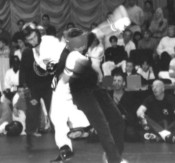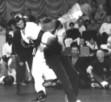

ARTICLES 10 Tips For Successful Competition by Stuart Anslow III |
10 Tips For Successful Competition |
1. Preparation Preparation is an essential part of competition build up. Ideally you should start doing extra training at least one, preferably two months in advance. In the club you should push your fitness, this will not only make you fitter but develop that 'never say die' attitude, better known as indomitable spirit.. All sparring should be serious against all opponents no matter what grade. After all failing to prepare is preparing to fail. 2. Extra Training All students that are entering a competition put that extra bit into their training, so you need to go one step further. Extra sessions outside the club (at home) will help immensely. Practice your patterns as often as possible, road work & shadow sparring are a big help also. A training partner is a good idea as well. 3. Prepare your mind Visualise the competition. If you know who your opponents usually are then Visualise beating them ....easily. If you don't know who your opponents will be then just visualise yourself winning, over & over again. Often its not down to who's got the skill to win, but who's got the will to win. 4. Stamina Work As I said above, roadwork (running) is an essential part of your extra training. Nerves & the adrenaline they produce really take a lot out of you. Running & sprinting will aid in the loss & recovery of essential energy. Bag work, as in a heavy hanging bag is also a good stamina builder. Not only do you work on your stamina, but also your speed & accuracy. Always train in rounds & perform for longer than you will have to at a competition. You need to build up anaerobic & aerobic energy. 5. Speed work This is all about kicking & punching as fast as you can, but on target. Work on your speed & retraction. Use the heavy bag, focus mitts or a partner and also when sparring. For competition its better to kick faster than harder. 6. Distance & timing Another essential part of your competition training. In the club work on your distance & timing by keeping just out of reach of your opponent, then attacking & counter-attacking at opportune moments. Learn to read your opponents quickly, if your opponent seems to be a leggy kicker fight inside, if he/she seems slow fight outside etc. 7. Confidence On the day of competition you should have confidence in yourself & your techniques. Tell yourself how hard you've trained & how good you are & that this will be no problem. And remember if you don't know your opponents then the old saying 'when ignorance is mutual, confidence is king' comes into play. When you step into the ring keep telling yourself that its going to be easy, that your fit & prepared & beating this guy/girl will be no problem. Never let yourself look under confident as this will boost your opponents confidence. 8. Psyche The psyche-out of your opponents could play a major roll in winning or losing. People psyche people out in different ways. Ask different club mates how they do it. Different types of people can be psyched out in dirrerent ways, some can't at all. Don't bother trying to stare them out unless your positive it won't psyche you out & have the reverse effect. Never let them ruffle you or wind you up as this could be part of their psyche on you. Theres so many different ways it would take this whole mag to list them all. 9. Do What You Know Forget that tripple jumping spinning kick that you've been working on. Leave the flash techniques until you are positive you are miles ahead. Stick to basic kicks & they will come out fast & natural. Always try to score, as too many fakes & dummy kicks waste precious energy. 10. Attack or Defence Counter attacking is a lot harder than people realise. Its better in most cases to attack as continiously as possible. If your the one attacking your opponent will find it very hard to get their attacks in. If your feeling tired don't just run around the ring trying to avoid contact, but rather attack in short, fast spurts, blitzing your opponent with four or five techniques then moving out of range. |
GO TO |


SECTION 1 |
GO TO |





